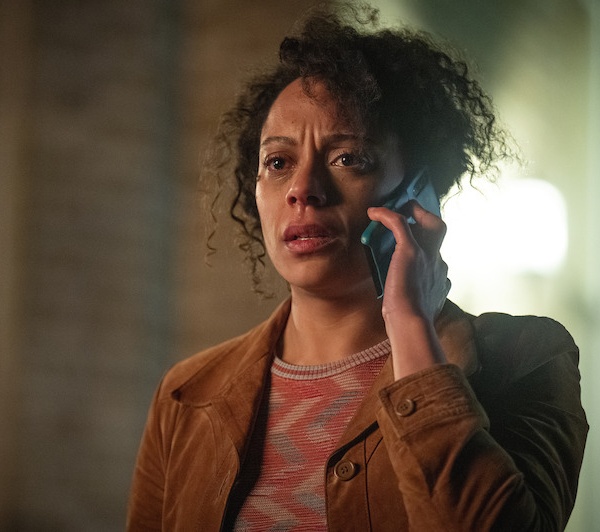
This is a republish of our review that ran last year during the Tribeca Film Festival.
Shot beautifully, right in the middle of the Brooklyn neighborhood that houses The Playlist headquarters and even prominently featuring our local watering hole and one of its well-liked jovial bartenders, “Monogamy“nevertheless remains a fairly unconvincing portrait of a romantic implosion, and a picture that becomes unbearably precious and self-important once the amiable set up is dispensed with.
The feature-length debut of documentary filmmaker Dana Adam Shapiro (the excellent 2005 picture, “Murderball“), the relationship drama does start out promisingly enough with its gorgeous, textured cinematography (some of the best digital shooting we’ve seen in while) and a strong cast in Chris Messina, Rashida Jones and local Brooklyn actor Ivan Martin, but the film eventually starts to grate and buckles under the weight of its own vanity, melodrama and self-seriousness.
Centering on two engaged thirtysomethings, Theo (Chris Messina) and Nat (Rashida Jones), who are stressing over their upcoming nuptials, the picture seems to posit that happy relationships become undone by the one vile element that seems to always be readily available to affluent, blithe and successful white people, despite their inherent contentment: self-destructive boredom.
Painfully true, but woefully hard to sympathize with.
Theo is a wedding photographer that moonlights on the side with a “gumshoe” photography art project, where he stalks and tracks subjects, taking stealthy photos. People take to the idea and he makes decent side money from the project, but is distracted from his cute, funny, smart and talented singer-songwriter fiancee, Nat, when a new subject comes into his surveillance frame.
Dubbed “subgirl” (Meital Dohan), this female subject hires Theo to take pictures of her playing tennis with friends, only when he arrives to clandestinely shoot her, he finds a subject who is more interested in masturbating on a public park bench.
Thus begins a voyeuristic twist in the film that takes a relationship drama and adds a sexual thriller element that just doesn’t gel with the tone that comes before. It takes us and Theo away from Nat, isolating her character from her fiance while she is in the hospital (with a small cut to her finger that somehow hospitalizes her for more than a week) and lets the groom-to-be wander off on his detective story, making Jones’ character feel paper thin and one-dimensional, which doesn’t help the film’s conclusion at all (one replete with melodrama that’s impossible to buy).
We’ve seen the bored, distracted, male 30-something story before — a guy who can’t see the good thing in front of him because his attention is diverted, magpie-like, by some shiny new muse — but Theo’s brooding, selfish character is impossibly hard to root for, so as an audience, we’re just left with the inevitable conclusion, and the hope that Nat leaves him sooner rather than later so we can all go home.
His obsession with subgirl — he gets in deep with photo clues, discovering she’s married, has tattoos, etc. — seems sudden and rushed, making it fairly unconvincing that he would jeopardize what he has with Nat to find out who this woman is. What’s worse is their marital spats are fairly benign and the hospital conceit seems like poor screenwriting to remove the female protagonist and let the male half navelgaze and take over.
 Even more distressing is just how self-serious and egoistic the film’s various aesthetics are. While Jamie Shaft‘s original score is atmospheric and quite good on its own, it’s far too dark, somber and moody for the picture at hand. It just screams ‘insert deep, important, gravitas here.’ Likewise, the camera work is great, very contoured digital work that the cinematographer should be proud of, but the framing is so painfully self-conscious — moving and darting around at random objects for no particular other reason than to try and feel documentarian and alive — that it becomes immensely irritating (that aesthetic choice is probably there to push the fetishistic voyeurism theme forward, but these filmmakers lay it on thick and don’t know when to say when; “Sex, Lies & Videotape” this is not).
Even more distressing is just how self-serious and egoistic the film’s various aesthetics are. While Jamie Shaft‘s original score is atmospheric and quite good on its own, it’s far too dark, somber and moody for the picture at hand. It just screams ‘insert deep, important, gravitas here.’ Likewise, the camera work is great, very contoured digital work that the cinematographer should be proud of, but the framing is so painfully self-conscious — moving and darting around at random objects for no particular other reason than to try and feel documentarian and alive — that it becomes immensely irritating (that aesthetic choice is probably there to push the fetishistic voyeurism theme forward, but these filmmakers lay it on thick and don’t know when to say when; “Sex, Lies & Videotape” this is not).
All these tactics take what should be a fairly simple and easy-to-get-across story about relationship implosions and self-combustion and lend a frustrating air of grave pretentiousness to the proceedings.
And “Monogamy” does little to hide its telegraphed story arcs. You know from 10 minutes in that this relationship won’t last, and after sitting through an enervating 95 minutes, by the time the tale ends, you can barely care about these characters or where they land. While there is a excellent selection of music in the film — Can, Loscil, Elbow, and a few Califone tracks including the wonderful, “The Orchids” in the closing credits — the nice sonic distractions do little to salvage this mostly overbearing indie picture.
But perhaps that’s just our opinion; “Monogamy” won the narrative feature award at the Tribeca Film Festival (the less said about that the better, but seriously, there’s no accounting for taste). What this film truly could have used is a lighter touch and a sense of humor and playfulness because its self-importance sucks the air and energy right out of the room. “Monogamy” takes itself so damn seriously, it’s easy to find it all a monotonous slog. [D+]




